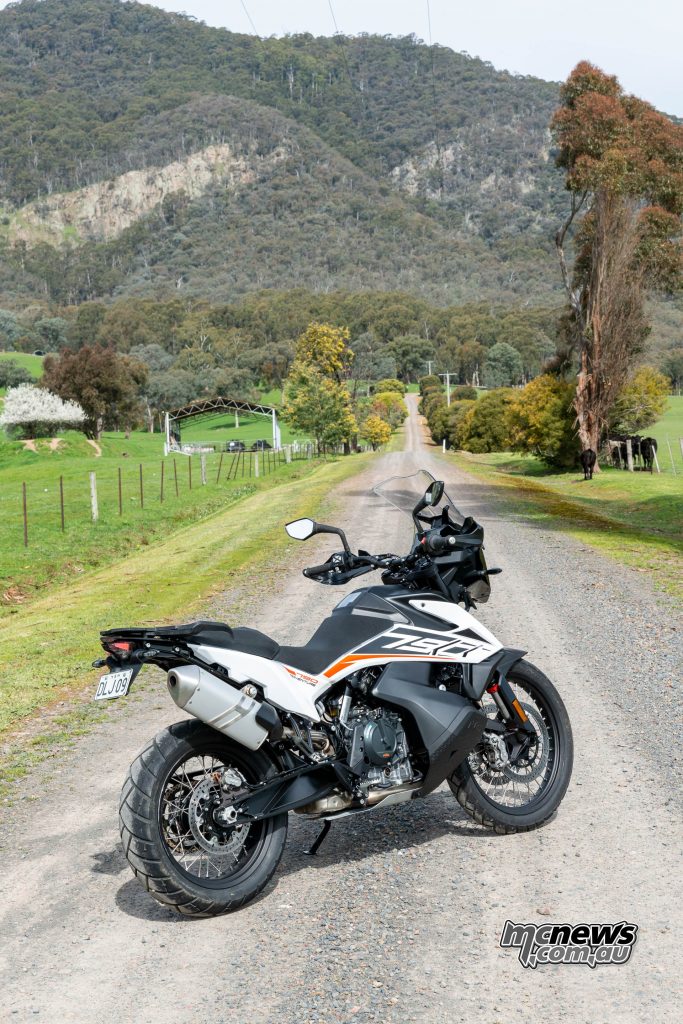2019 KTM 790 Adventure Review
Motorcycle Test By Vicko
For a fresh model, there’s a lot to like about the 790 Adventure. A whole lot. I spent some time on its sister bike the 790 Duke a few months back so had a reasonable idea of what to expect – but even then I was seriously impressed.
It’s a nice bike to live with day to day – and even with a couple of very minor niggles, it would have to go close to getting the gong for class leading mid-weight soft-roader.
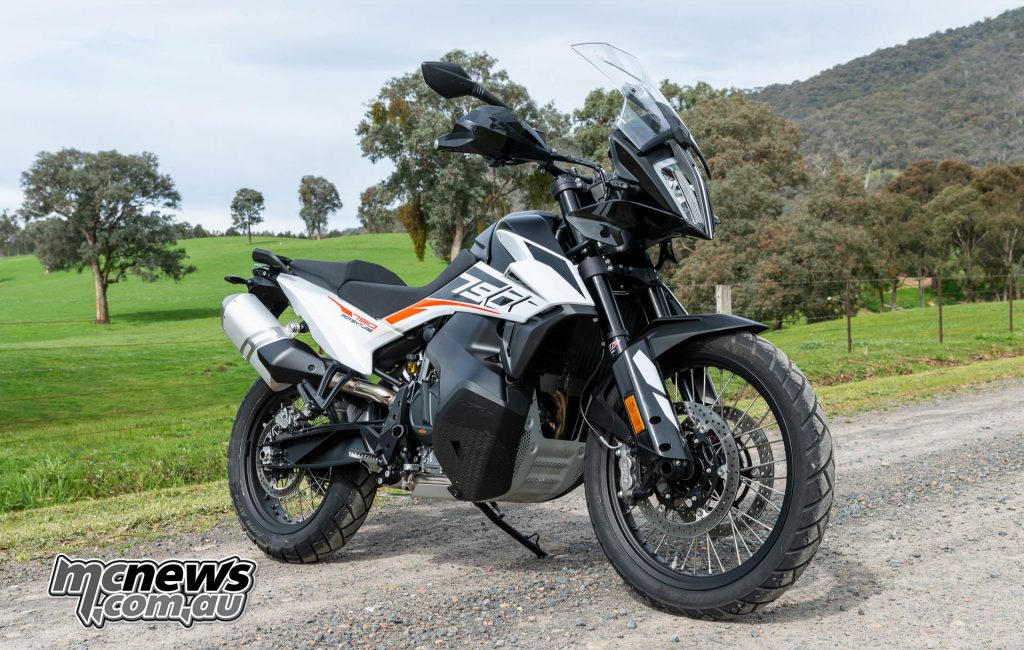
Contrasting to the Duke, the Adventure version has a little more scale to its overall dimensions and as a result doesn’t feel like a smaller capacity bike, like the Duke did.
I really gelled with the size. With its 850mm seat height it’s an easy thing to throw a leg over and on the go it feels super maneuverable. Worth noting that the seat height is 10mm lower than the F 850 GS, but it feels like a bigger difference than that.
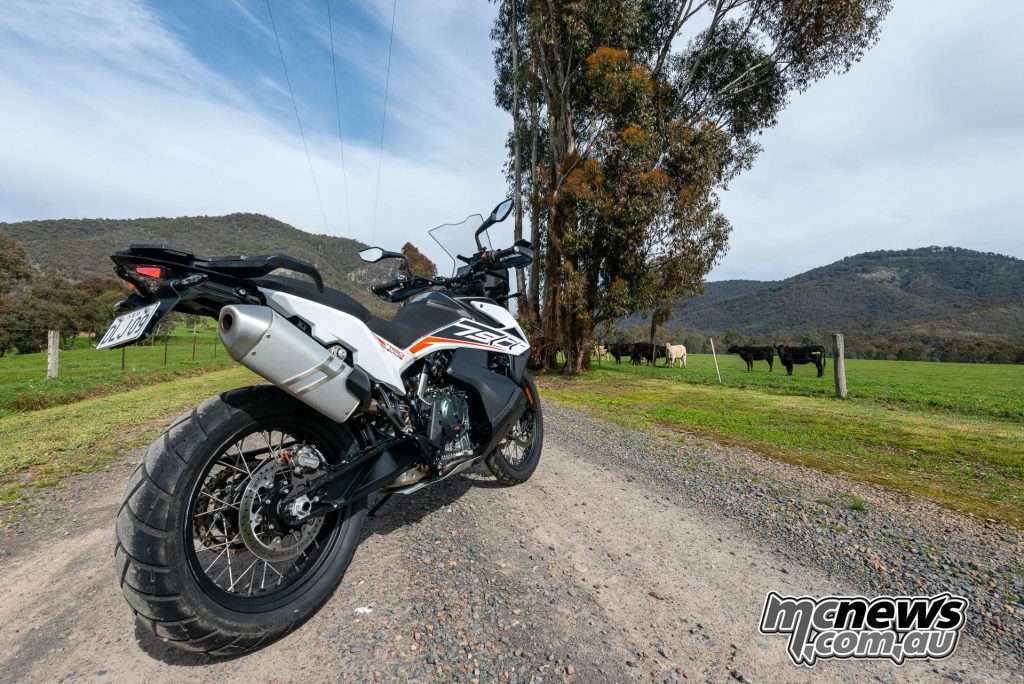
Also worth noting that it’s 30mm lower than the longer travel Adventure R version, and I’m sure that a fair chunk of the inherent handling capabilities come from the work that’s gone into weight placement and distribution.
The new 790 parallel twin is ridiculously compact, which allows the engineers to package it up in a way that gives even more clearance while keeping weight where it needs to be. And then of course there’s the funky fuel tank.
I admit that I had a bit of a psychological hurdle to get over with the placement of the wrap-around tank that drops down either side of the motor. The reality is that the design has no real issues for a soft-roader.
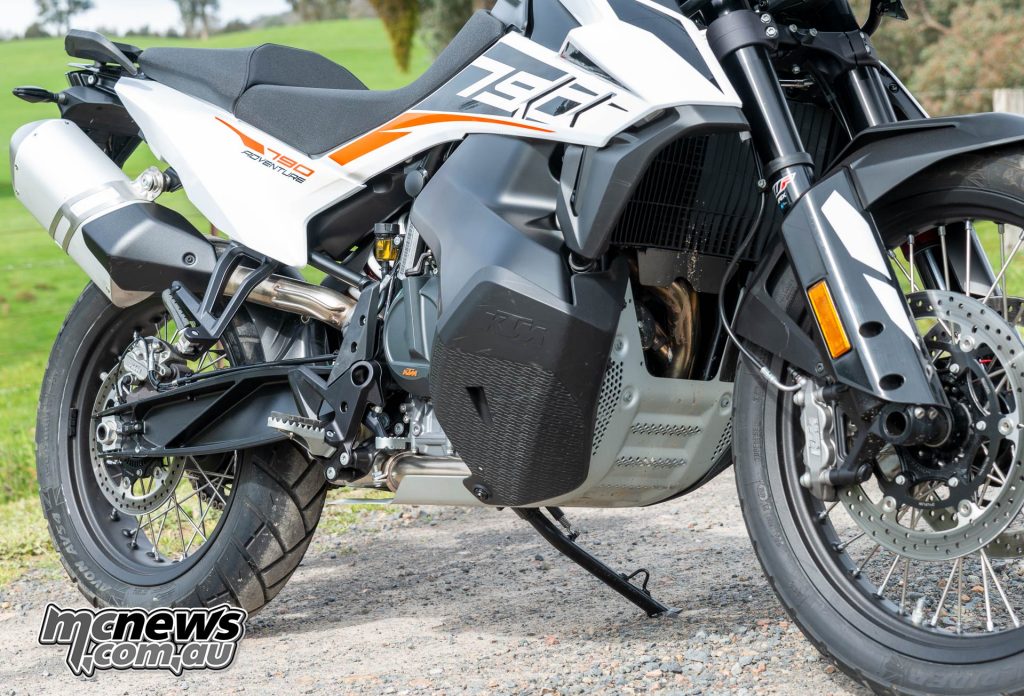
The only time I was conscious of them was when I was sneaking around the boom gate into the work carpark where you need to pay attention to the curb, but it’s still safely clear of getting close to contact. So the issue is a mental one to overcome.
There’s 20 litres capacity there which gives a very handy range – I saw over 440 km a few times on my commute and it would have still had another 20 km left in it.
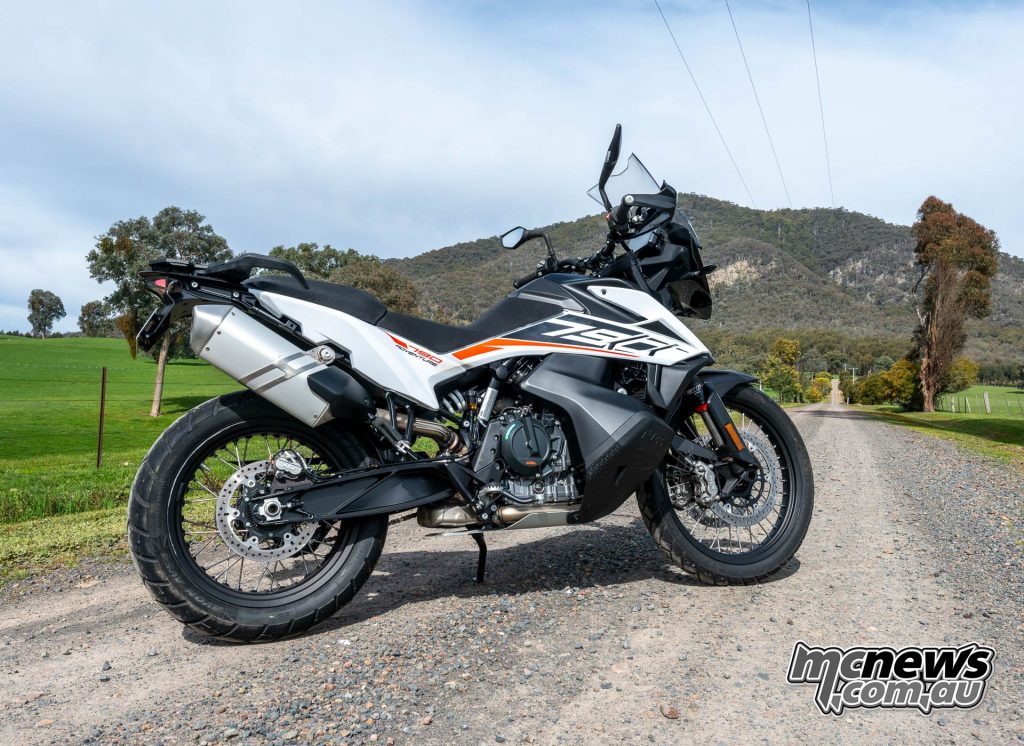
On the R version and if you intend on doing serious off-roading, then you’d throw some crash protection on there anyway wouldn’t you? I’m sure there are numerous options out there.
While thinking about options, you’d probably also want to throw some spotlights on it too as the headlight throw isn’t as wide as I’d like given that I often have no choice but to ride amongst roos at night.
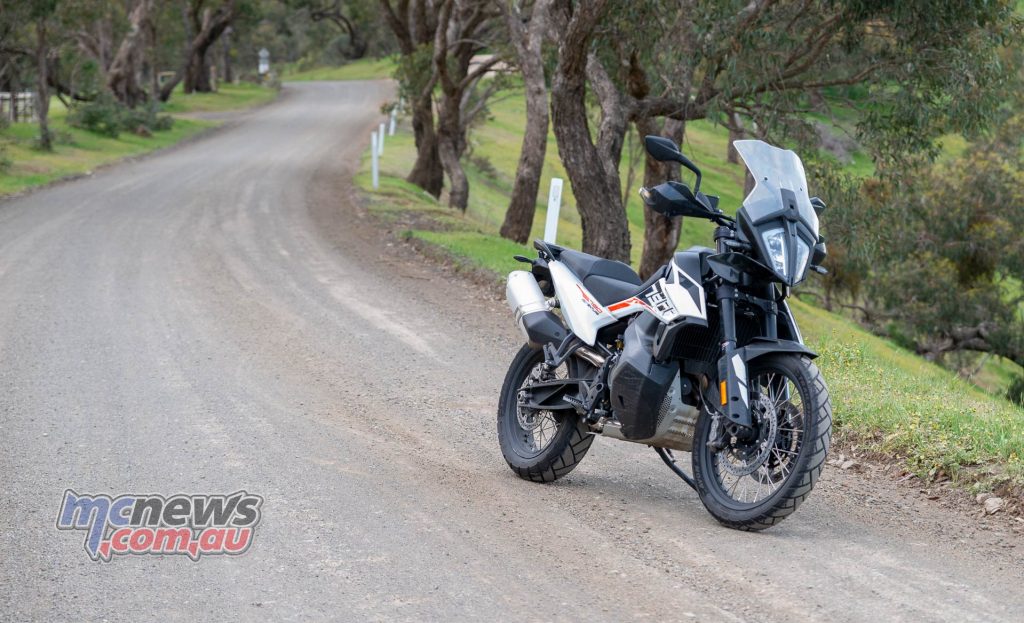
The engine is also a little detuned from the Duke variant. I dunno why. When you have the ability to switch tunes electronically and have such good traction control, I don’t understand why you’d dial some power out.
Just give it the full welly so when you can use it, it’s there!
When I picked it up I knew it was slightly detuned and my immediate impression was that there wasn’t much hump there.. but it was actually in ‘Off-Road’ mode which tames it down even further.
A bit of a poke of the mode button controls had that sorted and it was more like what I expected. There’s 95 horses there and it’s genuinely a very good thing on the go with a surprisingly strong mid-range and top end.
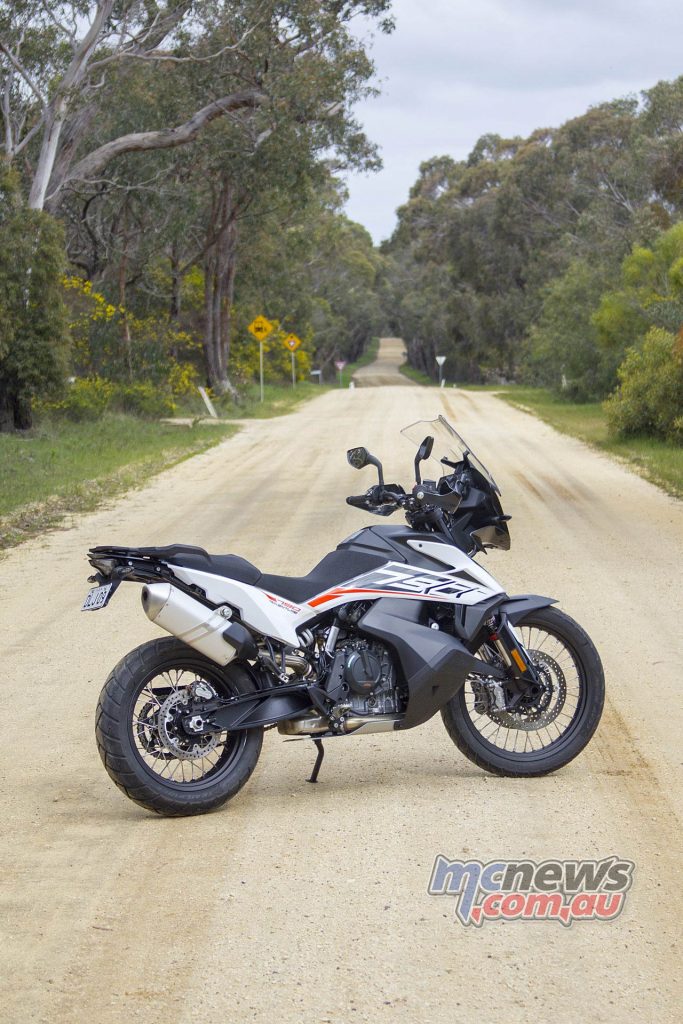
Top gear roll on is bloody impressive and feels on par or better than anything else in its class. It can protest a little if you ask too much of it under 2500 revs – which you can occasionally fall into doing as its so tractable you forget to change down.
But keep the 790 over 4000rpm and it’s superb. How strong? A little dip of the throttle in second gear and getting back on it will loft the front up every time. It’s a ripper.
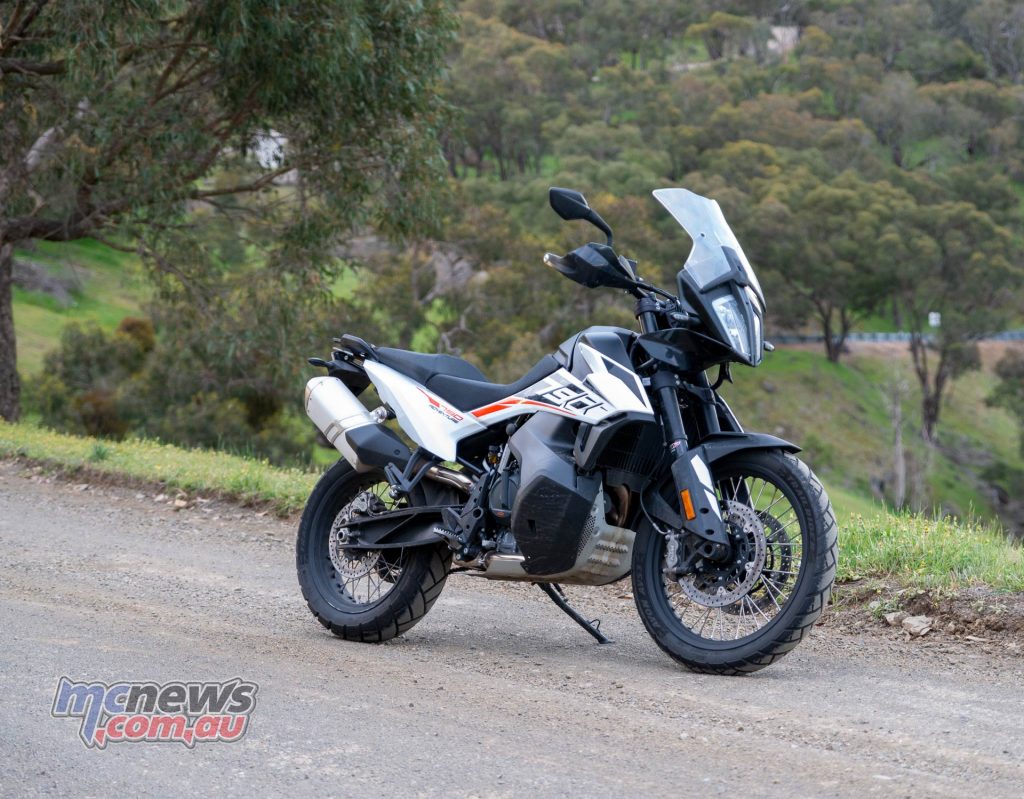
The throttle feel is spot on, as is the quick shifter. Super smooth. In fact.. And this might sound weird but bare with me, it’s almost.. too smooth? Is that even possible you ask?
Well let me explain. I did find that I’d occasionally miss up-shifts in that I’d find myself lifting my foot so gently that it would trip the clutch engagement and the revs would rise, but I hadn’t moved the lever enough to trip the gear change.
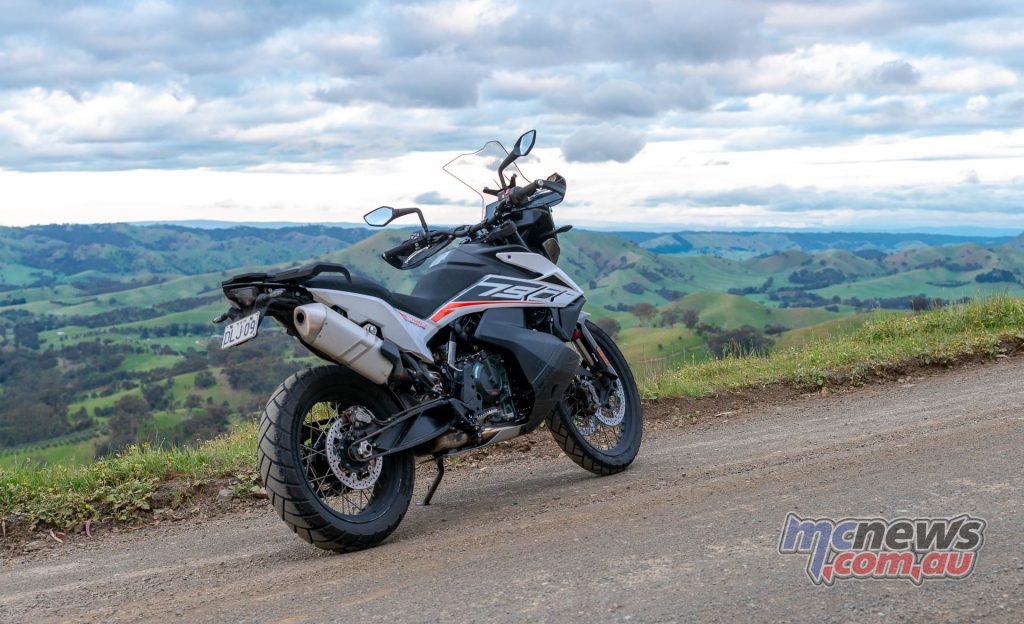
I’d probably like a little more solidity to the gear change, but it really is nitpicking. Admittedly the lever is positioned quite high with plenty of room for adventure/off road boots like mine – Trev commented on the lever position too but he was wearing road boots and had just stepped off the 1290 Super Duke and of course the shifter position is adjustable, it’s just that engagement is never quite rifle-bolt positive, a trait of pretty much every KTM gearbox I am yet to sample.
Downshifts were a delight and I didn’t miss a single one. You can almost lean on the lever and it will pull the gear in and slip down a cog. Lovely.
Suspension, brakes and overall handling were faultless and I found the riding position really natural. Controls are light and precise, like most soft roaders/adventure bikes the front brake is dialled more towards feel than initial bite to avoid dipping the front too much with the longer travel suspension – but there’s plenty of power once you give it a squeeze.
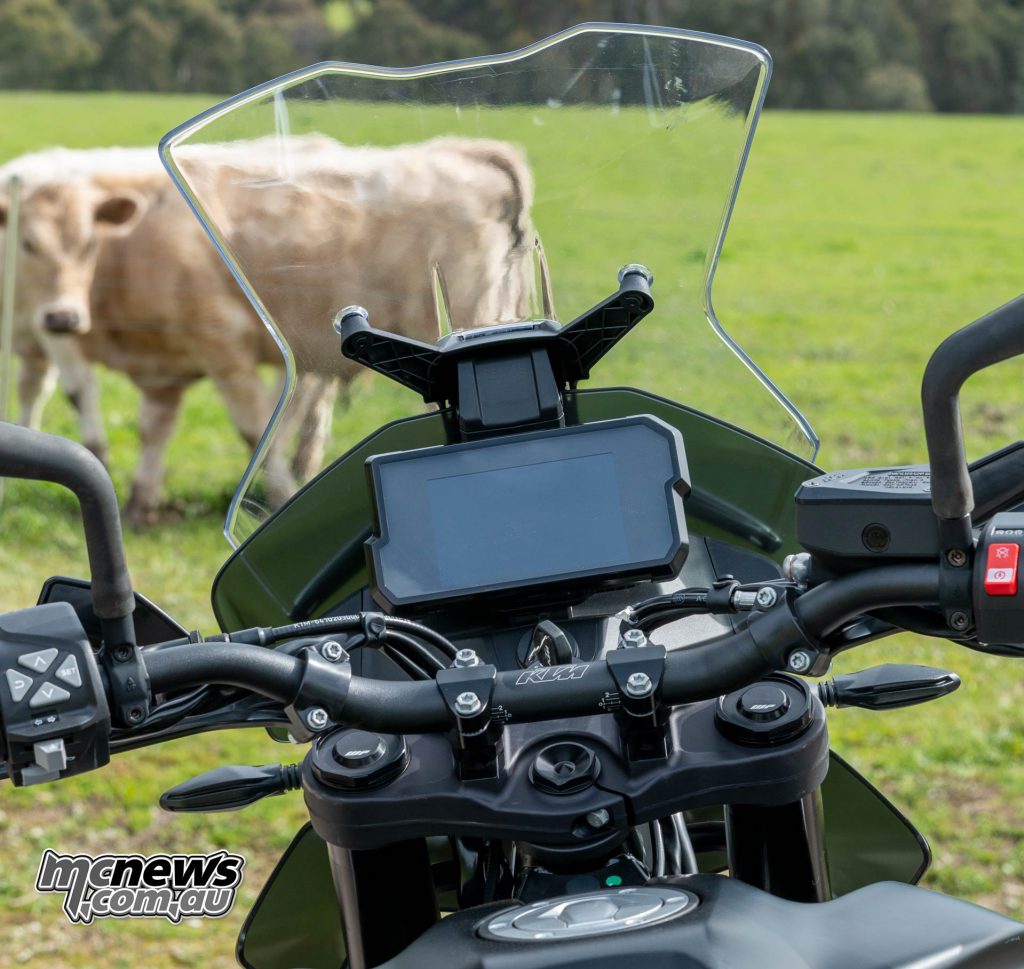
It’s a very, very nice place to call home for a few hours. The seat seemed like it might be a bit firm at first but felt fine even after four hours in the saddle on my single longest day. As I said earlier, it’s a good thing – even more so for a fresh model.
All of my real niggles are on – or related to – the dash. Which shows just how good the rest of the bike is. The fuel gauge only shows increments below half which is puzzling, and the range meter can only be described as schizophrenic when it gets down to the business end of the tank. As in the bit where you need it to be reliable.
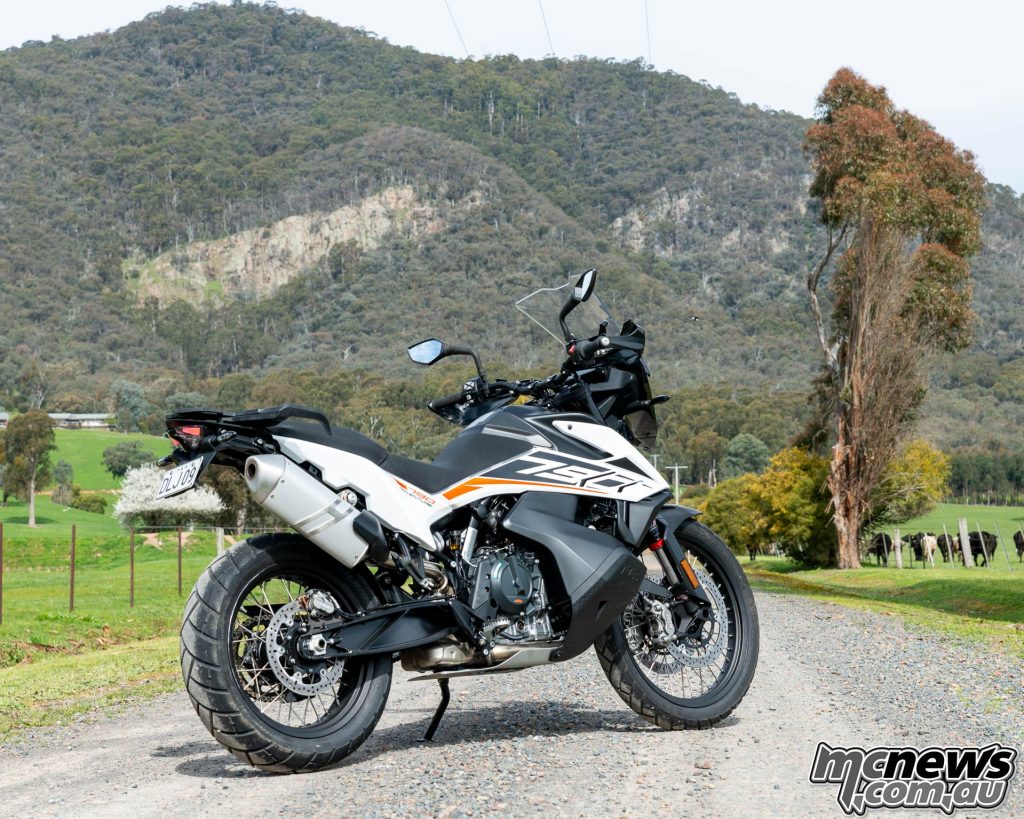
Examples? My last fuel stop is 45km from home. So I need at least 90 kays of range in it as I pass it each night. Several times I’d go past and it would say I still had 120km range. Then I’d be 15 minutes up the road and it would show 40km… Then the next morning it might show 40, then 20, 10, 0.. Then 20 again.. So it needs a bit of work. It needs a look at.
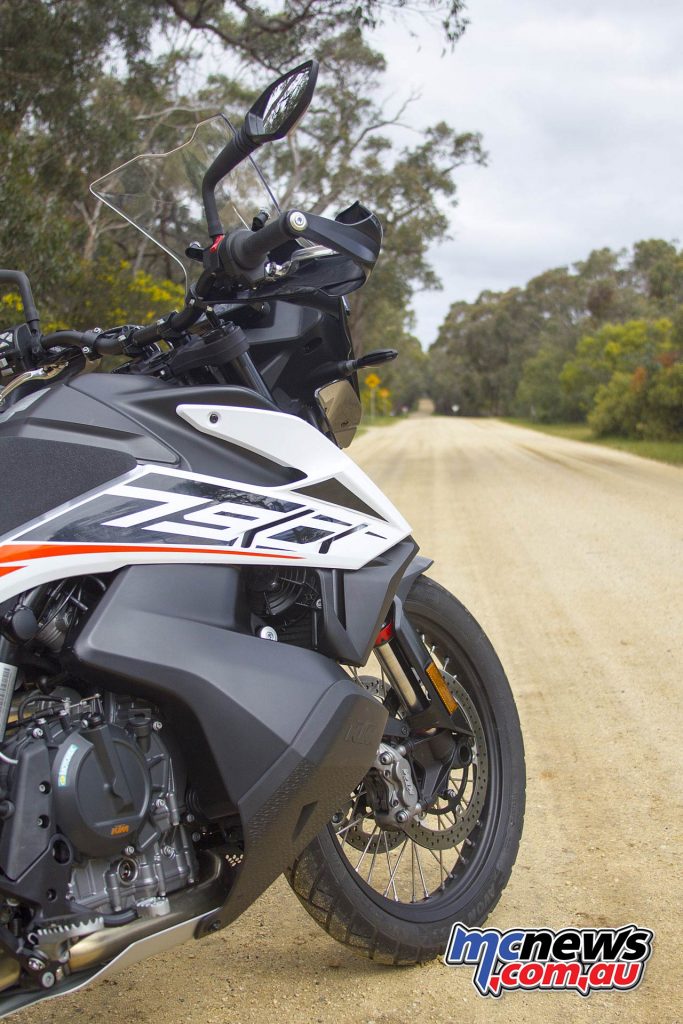
The final niggle is the system for switching modes and turning traction control on and off. And to be fair, KTM aren’t the only manufacturer doing this.
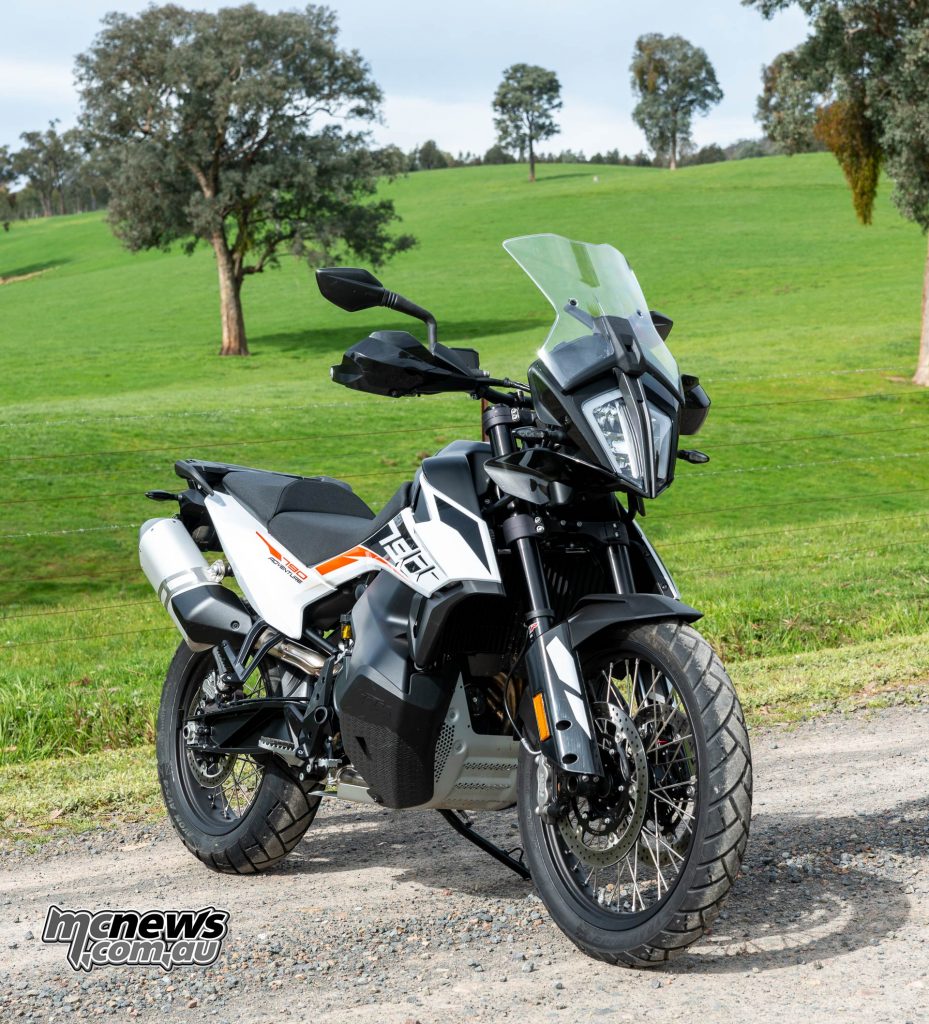
The trend of having multi-function buttons that you use to navigate through menus on the dash might be ok for more obscure setting changes and information, but it shouldn’t be used for ride mode or traction control.
Stick a dedicated button somewhere please that riders can press to activate and then press again to cycle through modes or toggle between on and off please.
Having to press two different buttons eight or more times (yes really), as well as rolling off the gas for three-seconds for traction control changes gets old pretty quickly when you’re transitioning from dirt to tarmac and back each ride and/or you feel like a bit of a play…
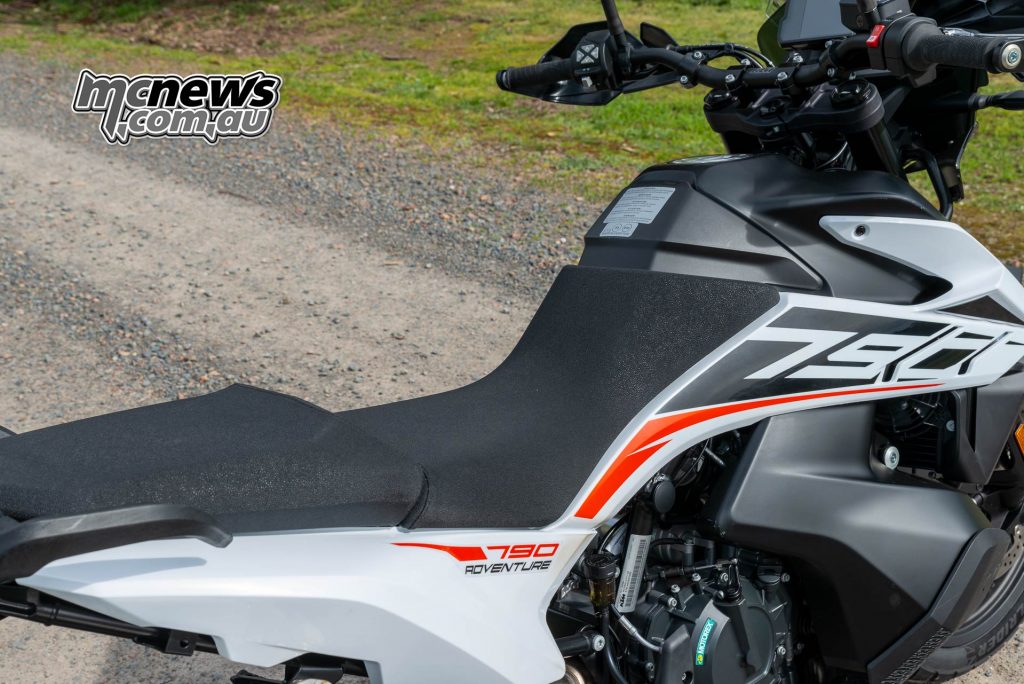
Once you do select off-road mode and disengage traction control though… It’s well worth it. The low seat height and ample mid-range make for great fun on a dirt road.
After spending some time on the Indian FTR 1200 S before this, which was a proper slide machine, I was in the mindset for skids… which the 790 Adventure is more than happy to oblige. That low seat height and clever weight distribution comes into its own once off tarmac and it’s a hoot. Mr Squiggle was out and about again.
Those dash related niggles aside, it’s a very impressive bike. Take my negative comments in the right context because they don’t impact the ride itself. I really do rate the 790 Adventure highly. So much so that the longer travel R version will absolutely be on the shortlist to replace my own Tiger 800 XC when the time comes.
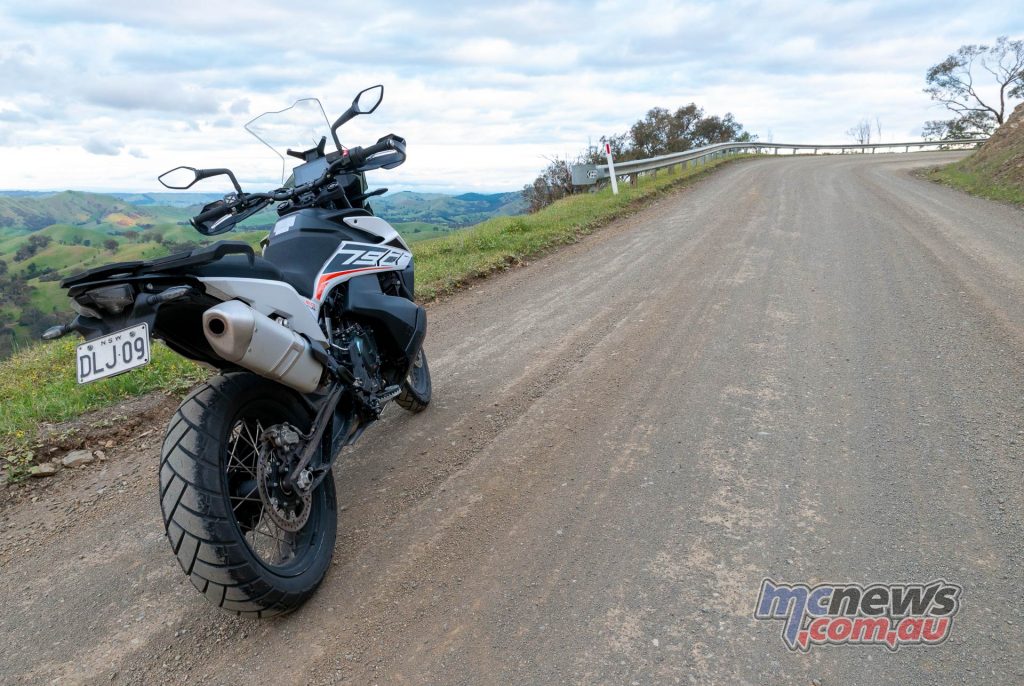
Why I like the 790 Adventure:
- Love the overall dimensions. Big enough to have plenty of room, small enough to still feel nimble – great manoeuvrability.
- That 790 engine has some serious punch from midrange up.
- Proper comfy for long hauls – and big range too.
- The low seat height will appeal to a lot of riders and makes it super accessible.
I’d like it more if:
- Eight or more button presses to change mode or disable TC? C’mon…
- Give it the full welly tune of the 790 Duke while you’re at it.
- The fuel range readings need a bit of a talking to.
- I’d have to tick the Akro slip on option for more noise (but I say that for every bike).
2019 KTM 790 Adventure Specifications
| ENGINE | |
| Displacement | 799 cm³ |
| Power | 70 kW |
| Torque | 88 Nm |
| Engine Type | 2-cylinder, 4-stroke, parallel twin |
| Bore | 88 mm |
| Stroke | 65.7 mm |
| Starter | Electric starter |
| Lubrication | Forced oil lubrication with 2 oil pumps |
| Transmission | 6-speed |
| Cooling | Liquid cooled |
| Clutch | PASC antihopping clutch, mechanically operated |
| EMS | Bosch EMS with RBW |
| Co2 Emissions | 98 g/km |
| Fuel Consumption | 4.19 l/100 km |
| CHASSIS | |
| Frame Design | Chromium-Molybdenum-Steel frame using the engine as stressed element, powder coated |
| Front Suspension | WP upside-down Ø 43 mm |
| Rear Suspension | WP monoshock |
| Suspension Travel F | 200 mm |
| Suspension Travel R | 200 mm |
| Front Brake | Dual radially mounted four-piston caliper |
| Rear Brake | Two-piston floating caliper |
| Front Brake Disc | 320 mm (x 2) |
| Rear Brake Disc | 260 mm |
| ABS | Bosch 9.1 MP (incl. Cornering-ABS and offroad mode, disengageable) |
| Chain | X-Ring 5/8 x 1/4″ |
| DIMENSIONS | |
| Steering Head Angle | 64.1 ° |
| Ground Clearance | 233 mm |
| Seat Height | 850 mm |
| Tank Capacity | 20 l |
| Dry Weight | 189 kg |
